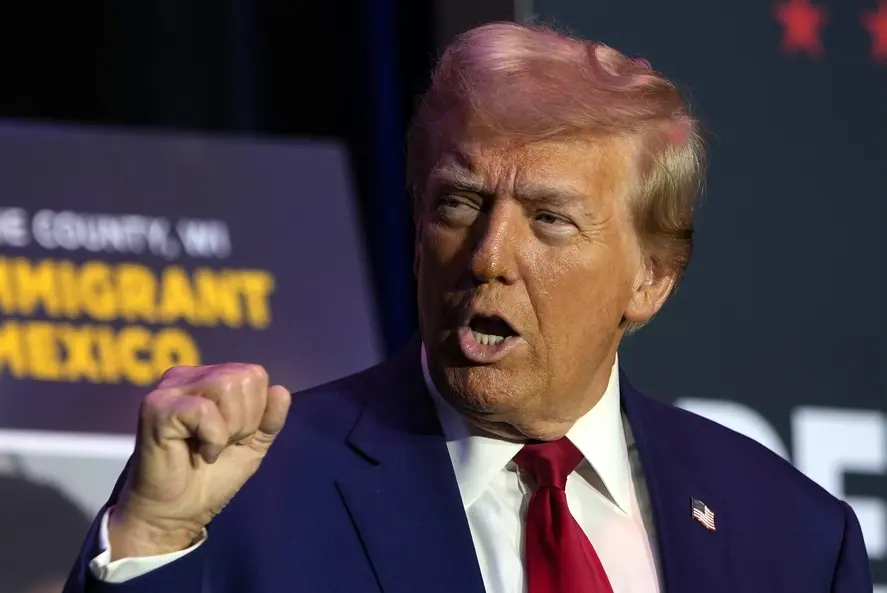Trump’s warning: America will become third world country if this happens
- Cloud 9 News

- Sep 2, 2025
- 4 min read

In a fiery response to a federal appeals court ruling that declared most of his sweeping tariffs illegal, President Donald Trump warned that the United States risks becoming a "Third World Nation" if the decision is not overturned. The U.S. Court of Appeals for the Federal Circuit, in a 7-4 decision on August 29, 2025, ruled that Trump’s use of the International Emergency Economic Powers Act (IEEPA) to impose tariffs on dozens of countries, including a 50% levy on Indian goods, exceeded his presidential authority. The ruling, which upheld a May decision by the U.S. Court of International Trade, has cast uncertainty over Trump’s aggressive trade policy, a cornerstone of his second term.
Court Rules Against Trump’s Tariff StrategyThe appeals court found that the IEEPA, a 1977 law historically used for sanctions and asset freezes, does not grant the president the power to impose tariffs. “The statute neither mentions tariffs nor has procedural safeguards that contain clear limits on the President’s power to impose tariffs,” the court stated, emphasizing that tariff authority lies with Congress. The decision affects Trump’s "reciprocal" tariffs, including a 10% baseline levy on nearly all U.S. trading partners and specific duties on countries like China, Canada, Mexico, and India, imposed to address trade imbalances and issues like fentanyl trafficking. However, tariffs on steel, aluminum, and other sectors under different legal authorities, such as Section 232 of the Trade Expansion Act, remain unaffected.
The court delayed enforcement of the ruling until October 14, 2025, giving the Trump administration time to appeal to the Supreme Court. The administration has signaled its intent to seek an expedited review, with Trump asserting on Truth Social that the Supreme Court will rule in his favor. “If these Tariffs ever went away, it would be a total disaster for the Country,” he wrote, calling the appeals court “Highly Partisan” and claiming the decision “would literally destroy the United States of America.”
Trump has defended his tariffs as critical to protecting American workers and boosting domestic manufacturing. He claimed on Truth Social that the tariffs have secured over $15 trillion in U.S. investment, a figure economists dispute, with Treasury Secretary Scott Bessent estimating annual tariff revenues at $500 billion. Trump argued that removing the tariffs would lead to canceled investments, economic devastation, and a decline to “Third World” status. “More than 15 Trillion Dollars will be invested in the USA, a RECORD. Much of this investment is because of Tariffs,” he posted, adding that the policies are “making America STRONG and RESPECTED AGAIN!!!”
The president also highlighted falling energy prices and low inflation as evidence of his policies’ success, though critics argue that tariffs have increased costs for U.S. consumers and businesses. For instance, companies like Adidas, Nike, and Mattel have raised prices due to tariffs on goods from countries like Vietnam and Indonesia, while tighter customs checks have caused border delays.
The ruling has significant implications for U.S. trade partners, particularly India, which faces a 50% tariff on its exports due to its continued purchase of Russian oil. Indian exporters, especially in labor-intensive sectors like textiles and jewelry, have expressed concerns about economic losses, prompting India to explore alternative markets and domestic reforms. Trade Minister Piyush Goyal stated that India “will neither bow down nor ever appear weak” in response to the tariffs.
Other countries, including Canada, Mexico, and the European Union, have also been affected by Trump’s tariffs, which he justified by citing trade deficits and drug trafficking. Canada, facing 35% tariffs on non-USMCA goods, has resisted concessions, while China has retaliated with tariffs and non-tariff barriers like export controls. The uncertainty has led to market volatility, with Japan’s Nikkei 225 index dropping 7.8% after new U.S. tariffs on cars were announced.
Domestically, the ruling has sparked debate over presidential authority and economic policy. Critics, including small businesses and state attorneys general who filed lawsuits against the tariffs, argue that they increase costs and disrupt supply chains. Jeffrey Schwab of the Liberty Justice Center, representing small businesses, called the decision a “reaffirmation of our nation’s core constitutional commitments.” Economists, however, warn that tariffs have led to higher consumer prices, with a Tax Foundation study estimating an average tax increase of $1,300 per U.S. household in 2025.
The Trump administration faces an uphill battle at the Supreme Court, where legal scholars across the political spectrum have questioned the use of IEEPA for tariffs. The court’s recent “major questions doctrine” rulings, which limit presidential overreach, could pose a challenge. If the Supreme Court upholds the appeals court’s decision, Trump may turn to Congress or other statutes, like Section 232 or Section 301 of the
Trade Act, to pursue his trade agenda, though these require more time and procedural steps.
For now, the tariffs remain in effect, and their future hinges on the Supreme Court’s ruling. As global trade tensions rise and domestic prices climb, the debate over Trump’s tariffs continues to polarize, with the president framing them as essential for American greatness and critics warning of economic fallout.














Comments